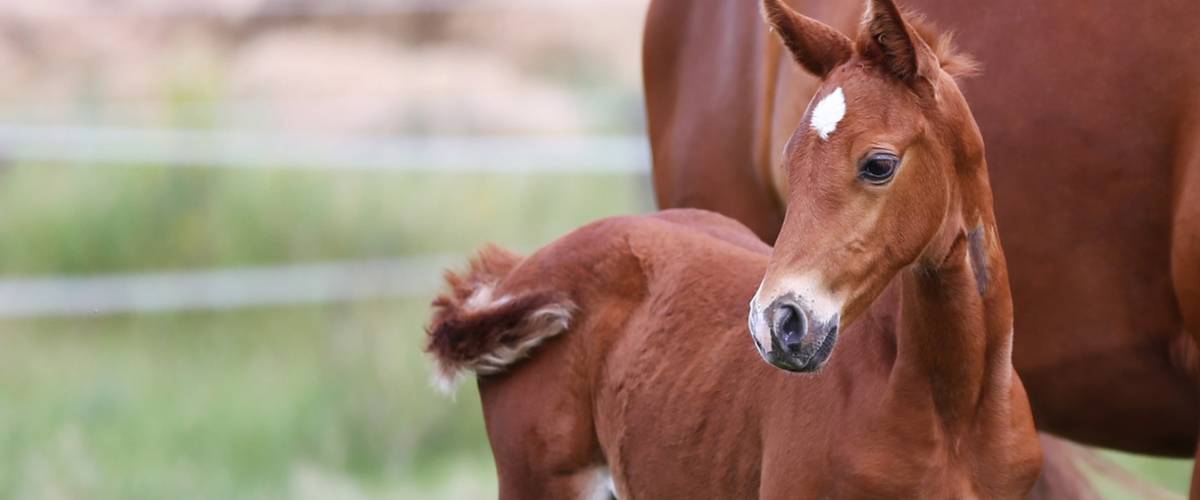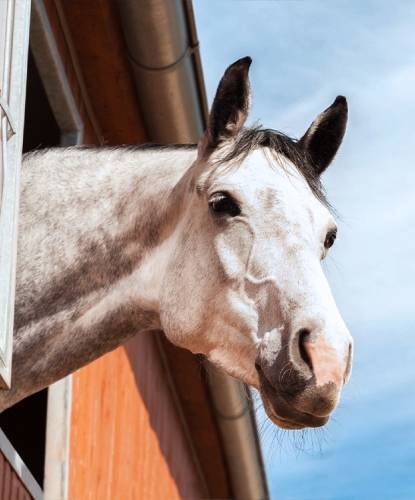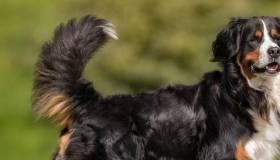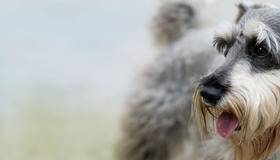
August 14, 2020 – “Lameness, which is typically related to orthopedic disease, is the most common cause for horses to not be able to perform their normal activity,” said Dr. Annette McCoy, Morris Animal Foundation-funded researcher at the University of Illinois. “It's a huge health and welfare issue in horses across breeds and across disciplines.”
And it’s why one of Dr. McCoy’s key interests is a developmental orthopedic disease in young horses called osteochondrosis or OC. OC is caused by abnormal development of cartilage on the end of a bone in the joint. In severe cases, OC can cause lameness and joint inflammation in foals, a major concern for many horse owners.
As many as 40% to 60% of foals across breeds are impacted by OC. About 70% of cases heal without intervention, but the remainder generally require surgery to remove a bony fragment and damaged cartilage. The good news is that most foals diagnosed with OC that have surgery improve and have no long-lasting problems.
Delayed Bone Formation
All bones start out as cartilage in utero, with bone cells replacing cartilage cells over time. For bigger bones, including the tibia in your leg and humerus in your arm, this process takes longer, from after birth until the bone reaches its adult length. Bone continues to replace cartilage until only a thin strip of cartilage remains at either end of the long bone forming a cap. This cap is a special kind of cartilage that covers the joint surface to make it work smoothly.
A delay of cartilage forming into bone near the joint surfaces is what causes OC. In some cases, this abnormal tissue separates from the underlying bone, forming a fragment made of bone, cartilage, and fibrous tissue, at which point the condition is called osteochondrosis dissecans or OCD. These fragments may remain in place or can get dislodged and float freely in the joint. Horses with OCD may develop lameness and/or swelling in the joint due to inflammation caused by the presence of the fragment. Over time, if not treated, this inflammation may lead to the development of arthritis and the need for long-term care and management.
Combination of Factors at Play
“Studies have shown that OC and OCD are complex disorders and lots of theories exist as to why cartilage that would normally turn into bone gets delayed and causes orthopedic issues,” said Dr. McCoy.
Studies show that animals with larger bodies and rapid bone growth, including horses, dogs, pigs and humans, is a contributing factor to the development of OC and OCD.
Some other triggers for OC and OCD development are:
- Nutrition: In the 1990s, Morris Animal Foundation-funded researchers looked at diets with mineral deficiency. These early pioneers of OC research helped establish that copper deficiency plays a role in OC by helping to produce soft, easily damaged cartilage. Other studies show a link between OC development and high-energy diets.
- Genetics: Some horse breeds, including Warmbloods, Standardbreds and Thoroughbreds, are more at risk of developing OC and OCD, suggesting these conditions are partially inherited. Dr. McCoy’s team currently is looking for multiple genetic risk factors for OC across horse breeds.
- Trauma and Exercise: External forces, including the foal’s day-to-day walking and playing, sometimes can cause trauma and damage the cartilage that was supposed to be bone. Early Foundation-funded studies looked at how normal exercise contributes to strain and microdamage of cartilage and bone in OC and OCD.
- Hormonal Imbalances: Studies show insulin and thyroid hormones may play a role in OC development.
- Blood Flow: Disruptions in blood supply to the affected area also may play an important role in the disease process.
How Do I Know My Horse Has OCD?
Unfortunately, the most common signs to look for also are signs of many other serious health issues in horses. Consult and visit your equine veterinarian immediately if you see:
- Swelling due to excess fluid within the joint, sometimes seen as early as 5 months with OC. Swelling associated with OC should not be hot or painful when touched.
- Lameness that varies with location and severity of the disease. OCD in horses most frequently occurs in the hock, stifle and fetlock joints.
In mild cases, foals can be asymptomatic, showing no overt clinical signs. Symptoms often appear when a young horse is put into work for the first time. To diagnose OC/OCD and rule out other causes of joint swelling and lameness, your veterinarian will perform physical and lameness exams, as well as imaging of the affected joint.
Treatment and Care
Treatment and care may differ depending on the severity of the disease. Cases of OC, in which a fragment is not present, can heal spontaneously without intervention, but additional control measures may be helpful. Once a fragment has formed, healing will not occur.
- Target Inflammation: A conservative course of treatment includes injections into the affected joint to help reduce inflammation within the joint. This approach is most likely to be successful in mild disease with minimal swelling and no lameness and/or disease in very young horses. Managing inflammation also is critical following surgery.
- Stall Rest: Restrict exercise for some weeks after diagnosis or surgery. Reintroduce exercise with the guidance of your veterinarian. Weight-bearing exercise, including walking, is beneficial for bone health but should be introduced gradually.
- Diet: Work with your veterinarian to make sure your foal is getting the appropriate micronutrients and adjust diet to reduce energy intake to help slow a growth rate that may exacerbate the condition.
- Surgery: Cases in which a fragment is present generally require the surgical removal of the abnormal bone and cartilage. Consult with your veterinarian or board-certified equine surgeon to find out if surgery is the best option for your foal. Studies show surgical removal of fragments in the joint at a young age, before horses are put to training, mitigates the negative effect of the disease in the majority of OCD cases.
Disease Risk
Dr. McCoy’s team is working to develop a new assessment tool to help veterinarians and owners better gauge the risk of a particular horse developing OC and resulting OCD. In the meantime, Dr. McCoy recommends that foals in breeds with high prevalence of OCD should be screened early. The inflammation caused by having a fragment in the joint can lead to arthritis down the road. Early detection is the best way to reduce long-term negative health outcomes caused by OC and OCD
“As an equine surgeon, I deal with orthopedic diseases literally every day,” said Dr. McCoy. “It’s a huge problem for our patients, particularly the developmental diseases like OC and OCD we see in foals. These diseases can lead to degenerative disease in older horses, especially if left untreated. My research is looking at understanding the underlying genetic reasons for why these diseases develop so we can develop better diagnostics and therapeutics that will hopefully address these common orthopedic issues in horses.”
To learn more about current Foundation-funded OC/OCD research, listen to our Fresh Scoop podcast featuring Dr. McCoy. The podcast provides a deeper dive into Dr. McCoy’s studies narrowing down the search for genetic factors that may increase a foal’s chances of developing OC.

Want to Learn More About the Health of Horses & Other Species?
Be the first at the stables to hear about breakthroughs in equine medicine. Sign up today to receive AnimalNEWS and other Foundation updates.




